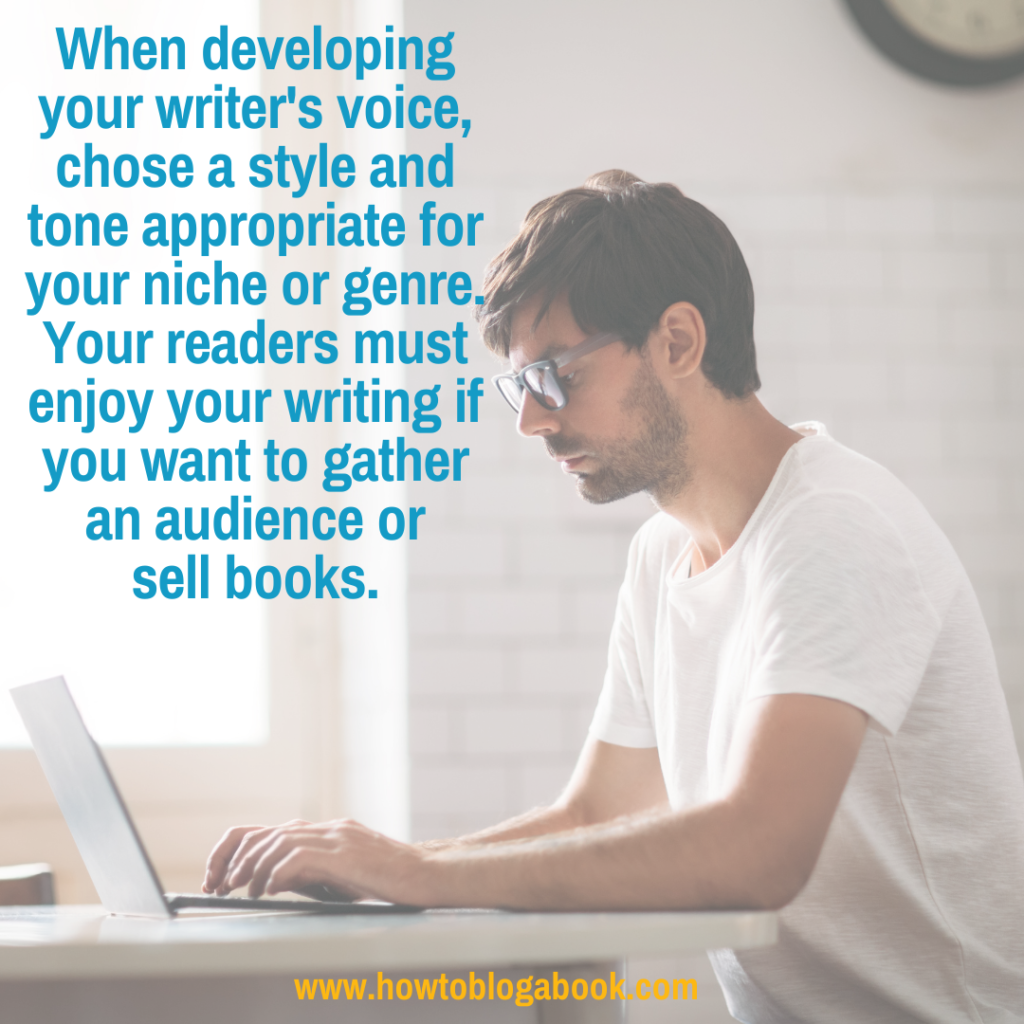How many nonfiction books have you read that you couldn’t finish because you didn’t enjoy the author’s writing style? Now, imagine your readers… You may have an excellent idea for a book. Still, if you’re using an inappropriate tone and style to convey your message, you might struggle to find—and keep—an audience.
Blogging a book isn’t just about sharing what you have to say. It’s also about how you say it. Two writers can write the same book, but their writing tone and style create two unique books.
The good news is that there’s an audience for most tones and styles of writing. Some readers want an informative, fact-heavy book that is direct and concise. Others are looking for narrative-led nonfiction, which weaves stories and anecdotes together to take the reader on a journey. And of course, there is a myriad of hybrid approaches that span the gamut.
So how do you develop a writer’s voice that works best for you and your audience? And why is accomplishing that so important? Let’s take a deep dive together into this topic.
First, let’s define these two terms—tone and style, which are used interchangeably. But whereas style is determined by the technical aspects of your writing, tone is more personal.
Writing Style
There are multiple styles of writing, each with its own purpose. However, there are four primary ones:
- Narrative Style tells a story based on real-life experiences. In nonfiction, it’s used to tell a story to illustrate a point.
- Descriptive Style uses a lot of adjectives to paint a picture, relies heavily on engaging the senses and can include similes, metaphors, and allegories.
- Expository Style is used to present ideas or concepts without expressing your opinion and relies heavily on facts, data, and statistics.
- Persuasive Style is another fact-based style, but it’s acceptable to include opinions if they’re supported by the facts you’re sharing.
The style you incorporate determines the language and sentence structure you use. For example, do you want to write a book that focuses entirely on facts and data, or do you want to include personal opinions or first-hand experiences? These are the choices you make when deciding on a writing style.
Writing Tone
It’s easiest to think of tone as an effective way to convey the attitude you have towards your topic. Here are some examples of writing tone: scholarly, serious, logical, opinionated, reserved, friendly, humorous, cynical, outraged, excited, ironic, intense, and emotional.
Your writing tone helps your audience connect with your writing. When you look at your circle of friends, there will be commonalities in your view of the world that help you connect with them. The same is true for your audience. Using an appropriate tone helps build a strong connection to pull them into the world you’ve created in your book.
Read in Your Genre
As a foundation, ensure your writing style fits within your target genre. The only way to determine this is by reading other books. The more books you read, the more apparent it will become that an endless variety of methods exist to say the same thing and convey the same information.
I had a full-time corporate career in the early days of my blogging journey. As a result, I was used to writing formal business presentations and software training manuals, which created a detached and generic writing style devoid of personality.
Unfortunately (for my blog readers), this is the style and tone of writing I adopted in my early blog posts. The knowledge-sharing posts may have been filled with useful information, but my delivery didn’t do me any favors when building an audience.
Know Your Niche
Back then, I wasn’t planning on writing a book. I just wanted to write. My blog was my training ground, and it took a few years of trial and error to find my way. However, reading books within the niche I wanted to write in helped me develop my writer’s voice.
My response to these books fell into two camps:
- Wow, that book was so bad; I could do better.
- Wow, that was an engaging read. I want to write like this.
Either of those two responses will send you down the right path. Together, they’ll help you define the type of book you want to write. Plus, they will help you identify what you like and don’t like about a specific book, and you can use that insight to develop your own writing style and tone.
However, don’t make the mistake of blinding forging ahead to blog your book without familiarizing yourself with your niche. Readers have expectations—if you veer too far off niche norms, you could end up alienating them.
Instead, take the time to read within your niche and find an appropriate style for your genre. This should be freeing rather than constrictive.
Bucking Niche Norms
You may have your heart set on a specific style and tone, but it doesn’t fit the niche norms. If this is the case, make sure you have realistic goals for your book.
I wrote a poetic memoir of my mother’s journey with Alzheimer’s. Poetry isn’t a usual writing style for this niche, and many of my poems about the highs and lows of this dementia journey were tongue-in-cheek.
I knew this book wouldn’t have a broad appeal and would never make me rich, but that wasn’t the intention. I just wanted to share my experience in my distinctive voice and help others realize they weren’t alone on the emotional roller-coaster of dementia. My words resonated with enough readers to make the effort of writing and self-publishing the book worthwhile.
Your goals help define your style and tone as a writer, as do the expectations you have for your book. So, by all means, write your book in the style and tone you want, but make sure you’re realistic about the sales impact of doing so.
Maintain Consistency
When you maintain a consistent tone and style of writing throughout your book, you’re less likely to lose your audience. So, settle on your writer’s voice. Then, check in to ensure you’re comfortable enough to maintain consistency with your individual blog posts. Bear in mind that it will be easier to maintain a consistent style and tone when it feels natural to you.
When you compile your blog posts into a book, they’ll become a cohesive collection of content that’s a pleasure to read. And they will clearly demonstrate your chosen tone and style.
Whether you’re comfortable with your writing style or still experimenting and evolving, tell me about the successes and challenges you’ve experienced as you found your unique writer’s voice. Leave a comment below, and please share this post with another blogger or writer.
About the Author

Jay Artale abandoned her corporate career to become a digital nomad and full-time writer. She’s an avid blogger and a nonfiction author helping travel writers and travel bloggers achieve their self-publishing goals. Join her at Birds of a Feather Press where she shares tips, advice, and inspiration to writers with an independent spirit.
Photo courtesy of msgrafixx.

Leave a Reply